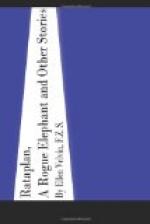The bear family was so varied, and so enormously large, Brunie explained to them, that she did not even know one-quarter of her own brown bears who lived in Northern Europe.
She told them, too—for she was a very intelligent mother-bear—that in whatever country bears lived they were peculiarly adapted to it. The Polar bear, for instance, had nice thick fur all over the bottoms of his feet; this protected him from the intense cold of the ice, and also prevented him from slipping. Then the bears who lived in hot countries did not have such thick coats as those who lived where it was cold.
“But,” said Brunie, in conclusion, “all bears are very much alike, and have much the same habits; all can climb, dig and swim, and all are very, very fond of honey.”
And the little bears listened to it all, and thought what a nice little mother-bear Brunie was, and what an extremely important family they belonged to.
But, as the months went on, Brunie began to get very thin and very touchy and irritable, and by the time June came she was so cross and savage that even her little ones were sometimes afraid of her. Curiously enough, all the other bears were just as cross and savage as Brunie; perhaps it was that they were all so dreadfully thin. But, whatever the reason, they snarled and growled, quarreled and fought until sometimes the little bears wondered what on earth was the matter.
The male bears seemed to be particularly savage, and even the hunters —those men who never seemed to be afraid of anything: not even a bear —were very careful to keep at a safe distance, and never attempted to molest them in any way.
All through that month of June the amiable affectionate nature of the bears seemed to have departed, and left in its place a vindictive, irritable and savage one—savage to their companions and to everything but the little cubs, and these the mother-bears never forsook. They took the same care of them as formerly, and fed and cared for them in spite of their irritable, bad-tempered mood. And woe betide anything, whether man or beast, who attempted to touch their little ones.
Brunie herself had a terrible time one day, when a band of hunters, seeing a mother-bear and her cubs alone, tried to capture them.
Furious with rage, Brunie rose up, and in her stiff, ungainly way went to meet them. Each of the hunters held a hatchet in his hands ready to strike at her, but Brunie cared not for hatchets, or anything else, where her little ones were concerned, and, going straight up to one of the hunters, she reared up on her hind feet, and with a terrific blow with one of her fore paws, which she aimed direct at the hunter’s head, she killed him on the spot.
Not hesitating a moment, she did the same with two other hunters, always aiming her blows at the head. And here she proved the truth of an old Scandinavian proverb, which says that, “a bear has the strength of ten men and the sense of twelve.” Brunie knew perfectly well that the quickest way to kill a man was to aim all the blows at his head, and this she did with fearful effect.




